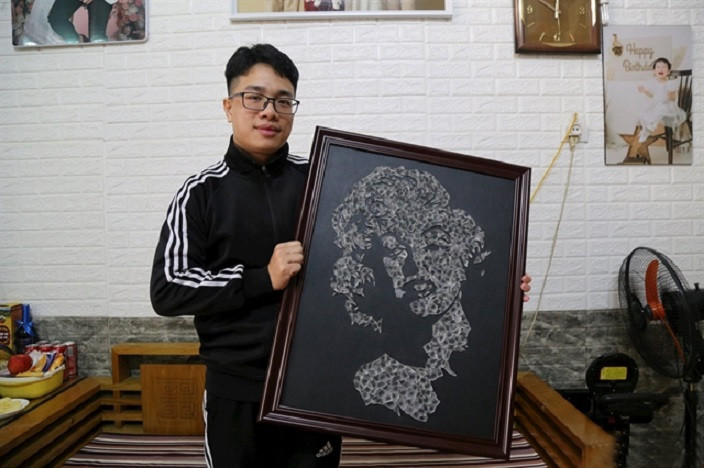
"I must re-use the glass debris to create something useful so it will be harmful to people no more," he said to himself.
He gathered the debris and took it home. After washing it clean, he realised it was too sharp to be usable and he could not handle it without a grinding machine.
Building the machine was never an easy feat as he had no experience in mechanical engineering whatsoever. However, he attempted to do it anyway and made it.
"Amazing!," exclaimed Thanh when he saw the first piece of glass that had been smoothed by the machine.
How the machine works is simple: the pieces of glass are rotated with diamond sand and water in the machine for three to five days. The low rotating motion of sand smooths them and turns them into shiny beads that are safe for crafting.
Thinking back to the tough times when he couldn't find the right type of sand to grind the glass debris, he said: "There was a time when the grinding machine kept running, but the glass debris remained sharp and didn't meet the desired quality.
"I had to spend a lot of time experimenting with different types of sand until I found that diamond sand was what I needed."
Thanh uses the beads to create works of art, necklaces, keychains and wind chimes. Sometimes, he lays the pieces at the bottom of the fish tanks for decoration.
"We can use the beads for many different purposes up to our creativity," said Thanh.
Simple works of art take him less than an hour to complete, but complex ones require a lot more time and effort as he has to pick every single bead and glue them together to convey his ideas.
Although he has no formal art training, his artwork never fails to amaze viewers with its vividness and lifelike quality, notably including the mosaic portraits of Uncle Hồ, General Giáp, and Marilyn Monroe.
When he shared the photos of his artwork on social media, he quickly gained the favour of art lovers. Some sent him colourful glass debris as materials for his artwork, others visited him and offered to buy his mosaic portraits.
However, he had no intention of selling his works of art. Instead, he gifted them to those who have a passion for glass to promote green practices and to charity groups to support disadvantaged people.
"When news reached me that my artwork was auctioned for charity, I felt a profound sense of purpose in what I am doing," said Thanh.
Although glass crafting never earns him a penny, he dedicates his free time to it and spares no effort to refine his pieces of art. He is working on a scheme to organise group workshops to inspire others and encourage them to use glass debris to make something useful.
He also plans to cooperate with other artists in opening an exhibition gallery for objects and items made from reused glass, where visitors can try their hand at glass crafting to enjoy hands-on experience.
"If we re-use discarded items to make useful ones, we can save money and reduce the amount of waste discharged into the environment"
"That's how we build a greener environment together," said Thanh.
He hopes that his pieces of art will act as a catalyst for the community to raise its awareness of the environment and take action to protect the planet. — VNS